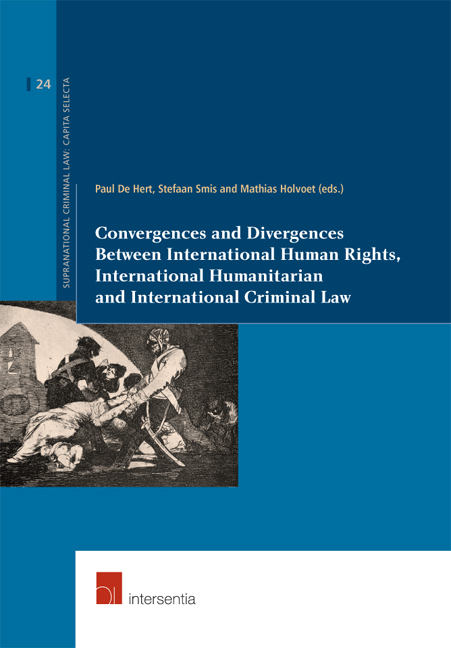Book contents
- Frontmatter
- Foreword
- Preface
- Contents
- About the Contributors
- Part I Convergences and Divergences between International Human Rights Law and International Criminal Law Stricto Sensu
- Catalytic, Gap-filling or Retardant Effects of Icl on Hrl: Quid Juris
- Use of Human Rights in International Criminal Law: Influence or Appearances of Legitimacy?
- The Future of the International Criminal Court: A Non-human Rights Body?
- Part II Convergences and Divergences between International Human Rights Law and Transnational Criminal Law
- Part III Convergences and Divergences between International Human Rights Law and International Humanitarian Law
- Conclusion
- Index
- About the Editors
Catalytic, Gap-filling or Retardant Effects of Icl on Hrl: Quid Juris
from Part I - Convergences and Divergences between International Human Rights Law and International Criminal Law Stricto Sensu
Published online by Cambridge University Press: 11 October 2018
- Frontmatter
- Foreword
- Preface
- Contents
- About the Contributors
- Part I Convergences and Divergences between International Human Rights Law and International Criminal Law Stricto Sensu
- Catalytic, Gap-filling or Retardant Effects of Icl on Hrl: Quid Juris
- Use of Human Rights in International Criminal Law: Influence or Appearances of Legitimacy?
- The Future of the International Criminal Court: A Non-human Rights Body?
- Part II Convergences and Divergences between International Human Rights Law and Transnational Criminal Law
- Part III Convergences and Divergences between International Human Rights Law and International Humanitarian Law
- Conclusion
- Index
- About the Editors
Summary
ICL AND HRL: AS DIFFERENT AS COMPLEMENTARY
For centuries, public international law (PIL) was seen as the legal order regulating the conduct of States and their interaction with other States at an international level. It was only at a relatively late stage that the rights of the individual to be protected from atrocities committed under the command of State authority were regulated (right to war/right in war, under the scope of international humanitarian law (IHL)). To a significant extent, it was with the unprecedented international crisis emerging from World War Two that human rights law (HRL) and international criminal law (ICL) robustly came into being. HRL and ICL are likely to be the two areas of PIL in which the individual's status as an international actor is of central relevance: in HRL as a (potential) victim of misguided State authority and in ICL as a (potential) perpetrator of some of the most severe crimes against mankind.
The HRL project traditionally aimed at protecting individuals against States’ abuse, thus limiting the State power. Instead, criminal law was developed to ensure the reach of the State over individuals so as to guarantee order and security. If it is true that HRL consists essentially of a mechanism defining inherent, personal (i.e. inalienable) rights and allocating these rights and resulting freedoms (‘espaces de liberté ’) to individuals by balancing potential conflicts between rights, criminal law sets in where some of these freedoms have been violated. From that perspective, criminal law acts as a guarantor so as to ensure that these rights are respected.
With the emergence of ICL, the distinction between HRL and criminal law became blurred. The ICL project was intended to criminalise the most heinous violations of fundamental human rights while at the same time activating the individual responsibility of perpetrators. ICL was therefore seen as a device for the protection and enforcement of human rights, as opposed to being a tool at the disposal of an arbitrary power to be used against individuals. It was then perceived as being more intertwined with HRL than with criminal law. Undoubtedly, ICL and HRL are linked insofar as both are based and built upon the key concept of human dignity.
- Type
- Chapter
- Information
- Publisher: IntersentiaPrint publication year: 2018



